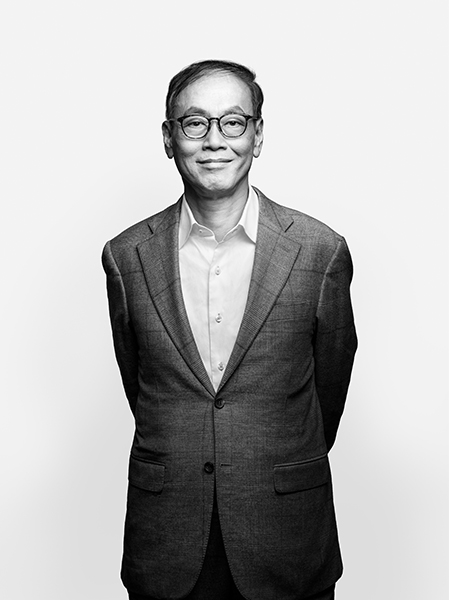What Will Help Us Succeed in China?
Growth and Profitability
What Will Help Us Succeed in China?
Like so many others, Clariant has identified China as the driver for global business growth and innovation. But unlike many other Western companies Clariant has put China at the heart of its global strategy to explore new opportunities and fully adapt to the country’s unique business environment.
External Expert Interview
Edward Tse
As one of China’s leading Global Strategy Consultants, Edward and his unique perspective on the country’s development were instrumental in developing Clariant’s China strategy.
Read the interviewWhat drives business and innovation in China?

Edward, what’s the biggest misconception Western companies have about China?
It’s the presumption that China’s development will follow the path of the West, and that they can simply copy and paste their strategy and business model to China. The typical Western stance is, »If this cookie-cutter approach results in success, that’s great and we know what we are doing! However, if it doesn’t, then the problem has got to be with China, and not our strategy«.
What makes China so different?
It’s an ancient civilization going back 5 000 years, but its modern business development is exceptionally young. Only since the reforms and opening of the late 1970s has China started to reconnect with the rest of the world. That development is far from perfect, but it has lifted 700 million people out of poverty. The China that you’re seeing now comes from a rather unique background and makes for a very different context compared to that of the West.
Is the role of the government as big as we think?
Going from a Soviet-style planned economy to a market economy takes time, and China is not entirely there yet. But today, relative to the state sector, China’s private sector is by far the bigger job creator and contributor to the country’s GDP. It’s also the primary source of business innovation. The reemergence of the Chinese entrepreneurial spirit is probably the most profound development in China’s recent history.
It led you to write a book in 2015 about »China’s Disruptors«. What contributed to their success?
What certainly helped was the size and growth of the China market, which allowed for rapid scaling of their business models. The prevalence of digital technology, specifically the wireless internet through smart devices, was the critical enabler.
What chapters would you like to add to this book today?
What’s special today is the fact that entrepreneurship is not just for the privileged. It has become the fabric of Chinese culture today. State-Owned Enterprises (SOEs) still play an important role, but many young people have realized that starting a business or working for a start-up rather than an SOE is a path for them to get where they want to be. If I were to write a new book about Chinese innovation today, it would be about the new era we’re entering with technologies like artificial intelligence, the internet of things, blockchain technology, and 5G. Those will have a profound impact on China’s innovation and business. The Chinese entrepreneurs will be at the forefront of that.
Are Western executives in China less open to innovation?
Western executives are very keen – I would even say indoctrinated – to base their strategy on the doctrine of core competencies: »Focus on what you are good at and don’t divert your attention to anything else«.
Why is that bad for innovation?
Because it limits what the company is willing to consider. Chinese entrepreneurs don’t necessarily have that ideological baggage. Many of them are happy to develop multiple business ecosystems even if they don’t have all the capabilities in place themselves. When they feel a new opportunity is worth pursuing, often they would rather jump before anybody else does and then fill the capability gaps along the way.
Are the gold rush days over for Western companies in China?
China continues to evolve and to open up. China today is very different from China ten years ago, and it will again look very different ten years from now. There is major potential for more growth. But if you want to make the most out of that, you need to put China at the core of your global strategy and organization, which means making China a part of your corporate brain. Including the ability to evaluate opportunities and to design, innovate, and execute new ideas. It’s impossible for a corporate headquarter that is thousands of miles away to fully appreciate what’s going on on the ground in China.
Internal Expert Interview
Christian Kohlpaintner
As a Member of Clariant’s Executive Committee, Christian spent more than two years in Shanghai, implementing the company’s unique China strategy.
Read the interviewHow can we harness China’s potential?

Christian, you’ve recently spent the better part of two years in Shanghai. What were you there for?
I had been responsible for Asia, and thus for China at the Executive Committee for some time, but we weren’t seeing the kind of progress we were hoping for. So my move there in 2016 was to show our commitment to putting China from »Fringe to Core« of our global strategy. And it’s been instrumental in building a China-focused governance structure that now reports straight to the top. We’re the first multinational to have based an Executive Committee member in Shanghai, mainland China.
What makes China so essential to Clariant?
It’s the largest single chemicals market in the world – twice the size of the US or Europe. China is also by far the fastest growing market. That makes for boundless opportunities and I’m more than ever convinced the future of Clariant will be decided in China.
How has the experience affected you personally?
I like to joke that China made me ten years younger. The speed and agility of doing business there, the pace at which you move and the way you use technology – it all »modernizes« you in a way that I really hadn’t expected.
Is it important for an executive to gain that kind of insight?
Let’s put it this way. I don’t need anybody to tell me anything about megatrends anymore. Clariant wants to tap into trends like urbanization, shifting demographics, mobility, and sustainability. But there’s only so much you can learn about these things from a cozy office in Switzerland. Living in Shanghai, I’ve experienced life in an exploding megacity of 24 million people first-hand – population density, traffic gridlock, the constant construction work and pollution. But I’ve also witnessed the unique Chinese entrepreneurial spirit.
What’s different about Chinese entrepreneurs?
They’re eager and open to innovate in a way that you rarely see in Western Europe. They’re optimistic. They’re ambitious, but also forgiving. Trying new things, failing, and then trying again tomorrow – that’s deeply embedded in their business culture. It’s also why I believe China should be our first market whenever we try to commercialize anything new.
What’s the goal for Clariant in China?
In 2016 we set out to double our revenue by 2021. And we’re on track to doing so. In the last twelve months we have been growing faster than any other competitor, be it multinational or domestic.
You mentioned sustainability as a trend. What role does that play in China?
Sustainability is a top priority in China’s current Five-Year Plan. And rightfully so! People long to see blue skies again. They view pollution as a risk to their newly found prosperity. The Chinese government is fully aware of this and takes measures unlike anything you see elsewhere. Imagine your local supplier being shut down literally overnight for not complying with new regulations. Some of these regulations, by the way, are even much stricter than in Europe.
Tell us a bit about Clariant’s new governance model in China.
It’s essentially about giving China a voice at the table whenever and wherever global business decisions are made. Each of our seven Business Units is run by a global management team and the five most relevant ones in China have a member solely responsible for the China business. That way, China is always on the global agenda. And we’ve gone one step further by establishing China as a sort of eighth Business Unit. Its head, our new regional president, Fu Cai Wang, reports directly to the Executive Committee, just like the heads of all our global Business Units, with whom he is on peer level.
Why did Clariant fill these new positions almost exclusively with native Chinese?
It reduces cultural and language barriers, which is crucial in China – no matter if you’re dealing with small local heroes or multi-billion dollar companies.
Was it hard finding the necessary talent?
We looked for seasoned business experts who not only know the Chinese market very well but also have ample experience with multinationals. The fact that we won over almost everyone we reached out to tells us that our China story is very compelling and thus has attracted top talents to Clariant.